- Home
- Hammond Innes
Levkas Man (Mystery) Page 11
Levkas Man (Mystery) Read online
Page 11
"Who told you that? Cartwright?"
"No. Hans. Alec, as you've probably guessed, is Holroyd's
protege." We had reached the water point and she paused, the stream close beside us, the gleam of it like steel in the starlight. "You remember that book Holroyd read for an English publisher? It was all there, all Dr. Van der Voort's thinking on the origin of our own species. In outline, that is. Nothing confirmed. Just theory. But then he sent those bones to Dr. Gil-more for dating." She seized hold of my arm, her voice suddenly raised against the sound of the water. "Please—try to understand. If Holroyd can get supporting evidence, then he'll go to this Congress, read his paper. Dr. Van der Voort's theories are unpublished. He'll present them as his own."
"And what am I supposed to do about that?"
"Find him, you fool," she answered stridently. "Find him and bring him back, so that he can take credit for anything that's discovered here."
"That's all very well," I said. "But Cartwright has already searched the area. Your brother was with him. And Kotiadis has been searching too—not just this area, but half the country. You realize he's a Greek Intelligence Officer?"
She nodded. "I wasn't sure. He said he was from the Ministry of Antiquities in Athens—the General Direction of Antiquities and Restoration, he called it."
"He's Intelligence," I repeated. "And he thinks the old man is a Communist agent. Not only that," I added, "but he's leapt to the conclusion that Cartwright knew this and that's why my father attacked him."
"But that's ridiculous."
"Maybe, but what's the alternative? Why did he attack him? D'you know?"
"No. I can only guess."
"Well?"
"Can't you see it—from his point of view? Knowing Holroyd was using him. Alec, too. It must have worked on his mind—a feeling of frustration, depression . . ."
"He was in a manic-depressive state you mean?"
"I don't know—yes, probably."
"But why—suddenly like that?"
She shook her head. "I don't know. He's so complicated. I don't pretend to understand him."
"Nor do I," I said. "I never did." I took hold of her arm. "Come on. Let's go and have that drink."
She nodded, and as we walked on I told her about Kotiadis and the questions he had asked as we drove up through Greece. "So you see," I said finally, "there's no question of my father being allowed to continue his work here."
"Yes, I see. And that's why we have a guard on the camp." She was silent as we turned into the steep alleyway that led up to the centre of the village. At length she murmured, "I can't bear the thought of Holroyd getting the credit for it all, for all his years of work."
"Not much chance of that," I said, trying to cheer her up. "Cartwright didn't seem at all optimistic about this dig when I questioned him this morning."
"Of course not. His instructions were to locate the dig from which those dated bones had come. The cave-shelter has a virgin floor, quite undisturbed. He knows this isn't it, but since Dr. Van der Voort disappeared . . . Well, he's in charge now. He may not believe in your father's theories, but it's a great opportunity for him, and there's always a chance."
We had reached the square by then. There were lights on in the taverna and the radio was blaring Greek music as ] pushed open the door. The interior was not designed for comfort, bare wood tables, some forms and the walls cracked and peeling. At one of the tables four men in open-neck shirts were playing dominoes, two others were talking, and an old man with drooping moustaches and baggy Turkish trousers occupied the only chair. All eyes were turned upon us as we entered. The owner appeared behind the counter that did service as a bar. He was a short bull of a man with black eyebrows and features that suggested he had just suffered some terrible loss. Sonia smiled at him. "Kalispera, Andreas."
"Speras," he replied, his eyes on me, watchful like all the rest.
"What would you like?" I asked her.
"Coffee," she said. "Just coffee. All we have at the camp is tea and I'm not used to it. We drink coffee at home."
I nodded, remembering how it had been in Holland-coffee at all hours of the day. "Bad for the liver," I said, and she smiled. "We're plain eaters and we don't suffer from le foie."
I ordered coffee and ouzo for both of us, but she shook her head and said something to Andreas. "I'm sorry, I don't like ouzo. Just coffee, please."
We sat at the one vacant table, watching Andreas make the coffee on a paraffin burner. She had a few words of Greek, but though the occupants of the tavema were polite, it was not a congenial atmosphere. I talked to her about the Barretts and the voyage from Malta, but it scarcely seemed to register. She had withdrawn into herself, her small face devoid of any expression, her eyes fixed on one of the faded posters that decorated the walls, seeing nothing, only what was in her mind.
The coffee came, black and sweet in tiny cups, each with its glass of water and my ouzo smelling of aniseed. "Tile-ghrafima," Andreas said and handed Sonia a cable.
"It's for Alec," she said, glancing at it, and then she seemed to freeze, sitting very still, staring down at it. Finally she looked at me. "Professor Holroyd is taking the night flight. He will be in Athens tomorrow morning."
"Does he say why he's coming out here?"
"No." She folded the cable sheet and slipped it into the pocket of her anorak. "No, he doesn't say why. But it's obvious, isn't it?" She called to Andreas, and then she said to me, "I'm so sorry. I don't like the stuff, but I've ordered one all the same." And when it came she picked it up and drank half of it at a gulp as though it were geneva. "They're like vultures," she breathed. "That's what he always called them—the desk-bound academics—vultures." She looked at me suddenly, her face pale and tense. "Can I have a cigarette please?"
I produced one of the duty-free packets I had brought
from the boat, and as I lit her cigarette, she said, "Suppose I told you where he was—what would you do?"
I stared at her. "You know where he is?"
She shook her head. "No—not for certain. But I think I can guess."
"How?"
"The book—I told you I was typing his new book."
I had forgotten that. I lit my own cigarette, watching her, waiting for her to tell me, conscious that I was nearing the end of my journey now.
"What would you do?" she repeated.
I sipped my ouzo and drank some water. The water was very good, soft as milk and yet like crystal; spring water from the mountains, uncontaminated by chemicals. I hadn't expected this and I couldn't think of an answer. I looked at her and our eyes met, and after that my hands began to tremble, for I was certain she knew, and the prospect of meeting him, wild and alone in some secret place, brought back my boyhood fears.
"Well?" she asked in a level, controlled voice.
"Why didn't you go yourself if you knew where he was?"
"I wasn't sure—" She hesitated. "I thought perhaps he needed to be alone. But now—"
"Well, where is he?" I asked. "Where has he holed up?"
"First answer my question."
"All right," I said. "I'll go."
"Of course you'll go," she answered quickly. "But what happens then?"
"That's up to him," I told her, not relishing the prospect. "I can only offer to help in any way I can." It was what I had come for after all.
I don't know whether that satisfied her or not. She drank her coffee and finished her ouzo. "Let's go," she said. "I can't talk here." I paid and we said goodnight, but it wasn't until we were clear of the village that she told me where he was—or rather, where she thought he was. "On the main road, before you got to Jannina, did you see the remains of an aqueduct?"
It came back to me then, the hillside sloping green with that gaping hole high up in the rock, and Kotiadis saying my father had been in that village the previous year. "Ayios Giorgios?"
"No, not Ayios Giorgios." We had reached the water now and she stopped, her voice only just audible above the sound o
f it. "On the other side of the valley. I've never been there, of course, but he describes it in great detail—two whole pages. And it was so important to him that, typing it, I could see the whole thing. The road cuts the line of the aqueduct; on one side the water was carried on great arches, on the other the Roman engineers drove a tunnel through the mountain. The entrance to that tunnel is right beside the road. The tunnel itself is blocked by a fall, but above it, on the tops of the hills, there is an area of red desert sand. It's a hang-over from some-thing that happened twenty thousand years ago."
"And you think he's there?"
"I don't know . . . it's just a feeling." She was no more than a shadow in the starlight, standing staring towards the steel ribbon of the water. "That place was terribly important to him. He writes very factually, you know, not at all interestingly, except to experts. But this passage was different. It had a compelling sense of excitement." She hesitated, and then said, "You'd have to read it, I think, to understand. I can only give the facts—the geophysical facts and they're quite extraordinary. What he says is that during the last and most severe stage of the Wiirm glaciation the sea level of the Mediterranean was up to four hundred feet lower than it is at present. Violent winds from the south picked up the sand from the exposed North African coast and carried it to the Balkan peninsula. Greece was buried under that sand to a depth of two or three hundred feet. It's all gone now. You can see traces of red here and there in the soil, but twenty thousand years of erosion have washed the great blanket of sand away—except in this one place."
She looked at me and her hand touched my arm, holding it. "Will you go there—tomorrow? Will you see if he's there?"
And without waiting for me to reply, she went on, her words comina: in a rush: "If he is there ... it scares me to think of it. Alone in that place all this time. It made such a deep impression on him—the atmosphere of it. It seemed to fascinate him. You see, ever since those great dust storms, there's been life there, human life—Bronze Age, Neolithic, the old Stone Age, risht back to Mousterian Man. There's chert in the area and they knapped it like flint—chipped sharp slivers off to make their implements . . . knives, arrowheads, all their weapons, and the chippings aren't buried as they are in a cave-dwelling. Because of erosion, the evidence is lying there on the surface, so that he didn't have to dig—he could just read the w^hole story as he wandered about. He said it was a dead place, a sort of cemetery of continual human occupation." And she added with sudden intensity, "It's not healthy for him to be there alone." Her fingers tightened on my arm. "Will you go-please? Not in the Land-Rover. It's too conspicuous. There's a bus leaves the village about seven and you could hitch-hike (m from Jannina."
That was how I came to find myself wandering alone next day in the lunar landscape of the red dunes near Ayios Giorgios. Sonia had produced food for me, which she had stowed in his old rucksack, and by ten that morning I was in the cab of a cattle truck driving south out of Jannina. We called at two villages on the way, and it was a little after eleven-thirty that we came to the valley, the road snaking down between the hills, and that hole in the rock showing like a watchful eye above us. The aqueduct came into view, its ancient arches spanning the river, and beyond it the reservoir gleamed like a mirror in the sunshine. "Endaksi—Ayios Giorgios." The truck slowed to a stop where the road to the village turned off to the left. I thanked the driver and climbed out. "Herete." I waved him goodbye and he drove off, leaving me standing alone in the dust on the verge, the sun warm on my face. As soon as the truck was out of sight, I started down the
road which had been blasted out of the hillside above the reservoir. There was no breeze and already it was hot, an early spring heat-wave. Patches of red earth showed on the far side, and high in the sky a bird wheeled and hovered. At the far end of the reservoir the sloping face of the dam was white with the water pouring down it. And on the other side of the road, the aqueduct tunnel was a shadowed slit in the naked rock. There was no difficulty in reaching it. You could even walk in it without stooping, for it was built to the height of a man, tapered at the top like the entrance to a catacomb. It was so narrow that my body blocked the light and I probed ahead with her torch only to find that she had been right—the cleft was blocked by a rock fall about 25 or 30 yards from the entrance.
I switched the torch off and stood in the semi-darkness, thinking for a moment of those Romans hacking their way into the mountainside nearly 2,000 years ago. It must have been quite an engineering feat in those days. I wondered what the old man had been thinking when he had stood where I stood now. Had the rock walls told him what he would find on the top of the hill inside which he stood? It seemed unlikely. I had no idea what chert looked like then, but the walls were smooth, except for the marks of Roman tools. It appeared to be a fairly soft rock, volcanic probably, and no doubt an earthquake had caused the rock fall.
I walked slowly back towards the slit of brightness that marked the entrance, and when I reached it and stood again in the sunshine, I found my mind had moved far enough back into the past for the road itself to seem an intrusion. I followed the road, moving almost automatically, and where it curved round the shoulder of a hill, I found a goat track leading steeply up. It was not a very long climb, but the track zigzagged to a bluff, so that I had no view of what lay ahead of me until I topped the last rise and it burst upon me with all its strange unearthly beauty. Here, suddenly stretched out before me, was a world that was out of time, completely apart from the landscape in which it lay. Instead of grass and rock.
and the Greek flowers of mountains in springtime, here was nothing but desert—red, desiccated dunes, so bare of anything that a withered, stunted bush was like the prospect of an oasis.
I hesitated, shocked by the transformation. And when I finally started forward again, that red world, with its extraordinary timeless atmosphere, seemed to swallow me completely. The colour of the sand absorbed the sun's heat. The place was like an oven, and so deathly still that it seemed all life had ceased here long, long ago. I felt my nerves tingle and the hair of my neck stiffen. I glanced quickly up at the blue vault of the sky. Nothing stirred, no sign of that eagle, or whatever it had been, hovering; the sky was empty, as empty as the red dune world into which I was slowly advancing. And when I looked back, there was no sign of any other world behind me, only the scuff of my feet in the loose sand to show the way I had come.
It was a confusing place, for the dunes were a series of humps and hollows without any regular pattern. The sun was little help, for it was almost overhead, but as I topped a rise, I came upon something I could use as a guideline. At first I did not understand what it was. I was looking across a steep ravine of sand, and on the far side, the smooth red surface of the next dune was broken by a spill of stones. These stones built up like a cone to a point on the dune-top where they stood proud by at least the height of a man, as though a great cairn had been erected there. What puzzled me was where the stones had come from.
Standing there, looking around me, I saw that there were other points where stone showed through the sand. But these were all quite different, for there was no spill of stone and nothing had collapsed; here the rains and strong winds had eroded the sand overlay to expose the rock below. And since in every case the rock had been shattered as by a giant hammer, it was clear that this could only have been caused by ice. I realized then that the rock I was seeing exposed in the twentieth century a.d. was rock that had not seen the light of day since its shattering by the deadly cold of the last Ice Age.
But that did not explain the spill of stones on the far dune. I slithered down into the ravine. The floor was packed hard, but the soft sides made it difficult to claw my way up. When I finally reached the top, I found that the pile of stones had the form of a collapsed circle. There was a distinct hollow in the middle. It was like the shaft of an old well exposed by erosion of the surrounding soil until it stood like a column above the ground, finally falling in upon itself and spilling down the slope.
I was standing fairly high at this point and had a good view over the whole dune area. It was all of it red in colour, but two shades of red, as though formed by two different types of sand, and the dune formation was uneven—steeply humped in the ravines, but thin on the slopes with the underlying rock exposed in places. And then, as I turned to view the whole area, ^vhich looked as though it covered about four, possibly six square miles, I saw that there was another spill of stones several hundred yards away, and I thought I could see yet another beyond that. These spills were not so pronounced, the "well-heads" standing less proud of the surrounding sand, but what struck me immediately was that they were more or less in a straight line running in a south-westerly direction.
I understood what they were then. These were the remains of vertic al shafts connecting Avith the line of the aqueduct tunnel deep in the hill below me. They were either ventilation shafts, or else the Romans had used them for hauling out the rock cut from the tunnel, and where the rock ceased and they were into the red sand, they had had to line the shafts as well-diggers have to line a well in soft ground. A geologist could probably have gauged from the amount of stone debris exposed just how much erosion had occurred in the two thousand years since those shafts had been built. My guess was that it was 20 feet, and if the rate of erosion had been constant for the whole twenty thousand years since the last Ice Age, then that would give an original depth of 200 feet for the sand overlay. This more or less confirmed the depths Sonia had given me, since obviously the rate of erosion over such a long period would not have been constant.
I have gone into this in some detail, because the sense of being in a world lost to everything but geological time was very strong, and it affected my mood. It is true that I had seen goat, possibly sheep droppings in the dune bottoms, but this evidence that animals crossed the area in search of the next grazing land did not detract in any way from the feeling that this was a world apart; rather the reverse, in fact, for it made me conscious of the struggle life must have been when all of Greece had looked like this red throwback to a long dead age. And there were the flakes of chert. At least, I presumed they were chert—between brown and ochre in colour, quite small and sharply edged, so that I was certain they had been chipped from larger stones. I had seen them everywhere, lying on the surface as Sonia had said. One, which I had put in my pocket, looked like an arrow-head.

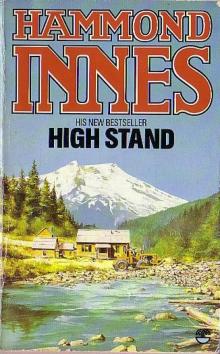 High Stand
High Stand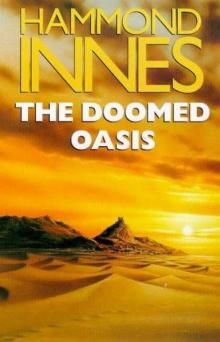 The Doomed Oasis
The Doomed Oasis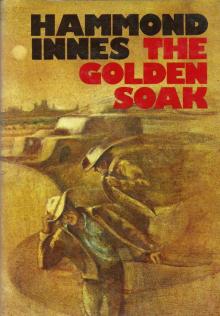 Golden Soak
Golden Soak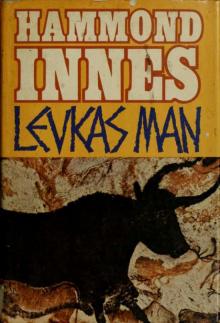 Levkas Man (Mystery)
Levkas Man (Mystery)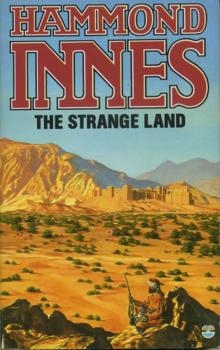 The Strange Land
The Strange Land Dead and Alive
Dead and Alive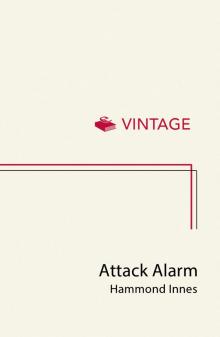 Attack Alarm
Attack Alarm The Strode Venturer
The Strode Venturer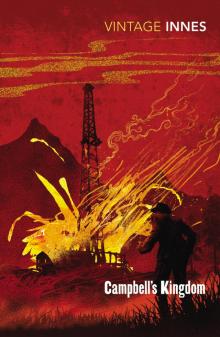 Campbell's Kingdom
Campbell's Kingdom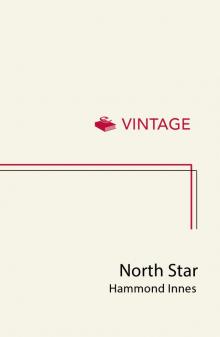 North Star
North Star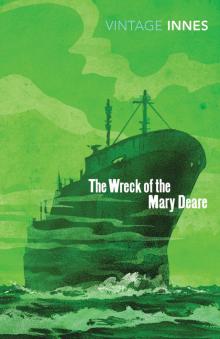 The Wreck of the Mary Deare
The Wreck of the Mary Deare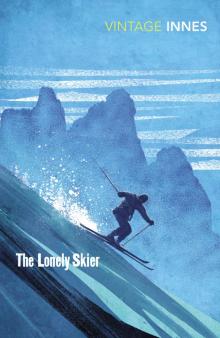 The Lonely Skier
The Lonely Skier The Black Tide
The Black Tide The Trojan Horse
The Trojan Horse Medusa
Medusa Air Bridge
Air Bridge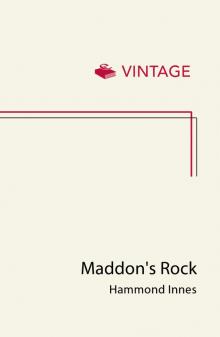 Maddon's Rock
Maddon's Rock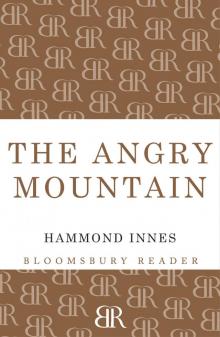 The Angry Mountain
The Angry Mountain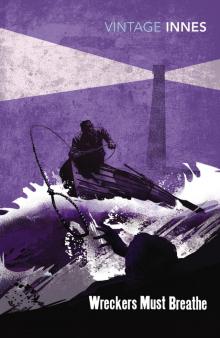 Wreckers Must Breathe
Wreckers Must Breathe Solomons Seal
Solomons Seal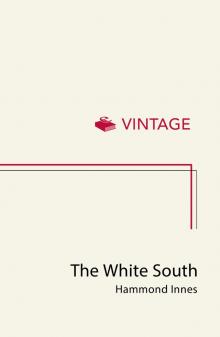 The White South
The White South